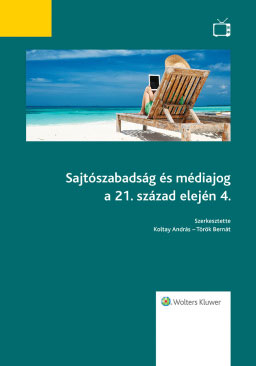Press Freedom and Media Law in the Beginning of the 21st Century No. 4
Newly published, ‘Press Freedom and Media Law in the Beginning of the 21st Century No. 4’ (edited by András Koltay and Bernát Török) is the fourth in a series discussing current issues in Hungarian and European media law, and offers essays on diverging topics to contribute to the investigation of the questions of media regulation, freedom of expression and new media in the 21st century.
 The latest publication by the Media Science Research Team of the Research Centre for the Humanities of the Hungarian Academy of Sciences is the fourth, final tome in the series Press Freedom and Media Law in the Beginning of the 21st Century. In 2013 the Team, set up jointly by HAS and the National Media and Infocommunications Authority, launched its research programme entitled ‘The Fundamentals of the European Media Law Mindset, with Special Focus on Certain Matters of Freedom of Speech’, which conjoins several ongoing research efforts in diverse areas of the law. Besides identifying the European approaches, it is equally important to investigate the legal systems of the United States and other jurisdictions with significant impact from a European perspective, and to analyze the interactions between them. The series Press Freedom and Media Law in the Beginning of the 21st Century is published with the aim of capturing in book form some of the achievements of the Research Team.
The latest publication by the Media Science Research Team of the Research Centre for the Humanities of the Hungarian Academy of Sciences is the fourth, final tome in the series Press Freedom and Media Law in the Beginning of the 21st Century. In 2013 the Team, set up jointly by HAS and the National Media and Infocommunications Authority, launched its research programme entitled ‘The Fundamentals of the European Media Law Mindset, with Special Focus on Certain Matters of Freedom of Speech’, which conjoins several ongoing research efforts in diverse areas of the law. Besides identifying the European approaches, it is equally important to investigate the legal systems of the United States and other jurisdictions with significant impact from a European perspective, and to analyze the interactions between them. The series Press Freedom and Media Law in the Beginning of the 21st Century is published with the aim of capturing in book form some of the achievements of the Research Team.
The editors compiled each volume with the intention of directing readers’ attention to the scholarly and professional underpinnings of the issues investigated in areas of media regulation and freedom of expression, which resonate with debates in the public and political spheres. Far from wishing to question the importance of the (often heightened) daily disputes about these questions, they did so in order to enrich the discourse with the actual and representative factors that scholarly research is tasked with identifying. They are convinced that public debate will also benefit from an awareness among its participants of the doctrinal frameworks of their dialogue, especially of the very fact that such frameworks exist, how they can be identified and how they should shape their communications on the matter. With this in mind, the editors of the series set out to collect scholarly essays discussing a wide range of subjects pertaining to the ever topical debates on the freedom of speech and the freedom of the press.
The book is available on the publisher’s website.